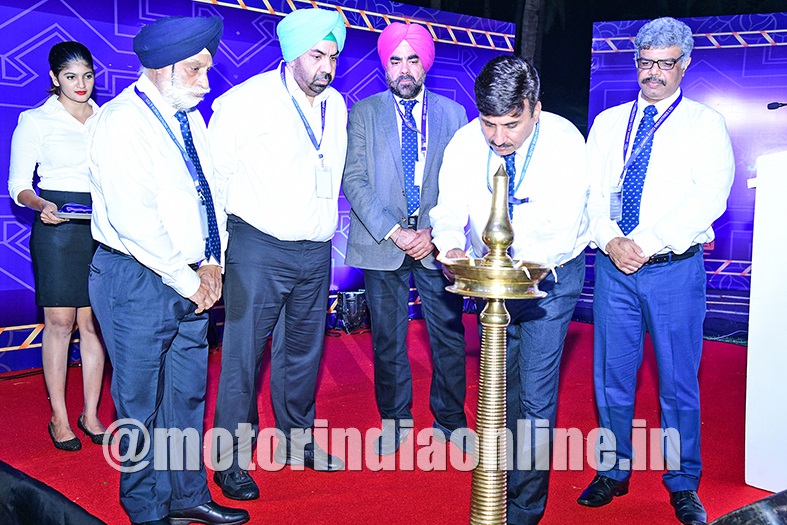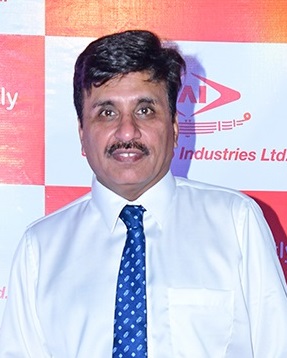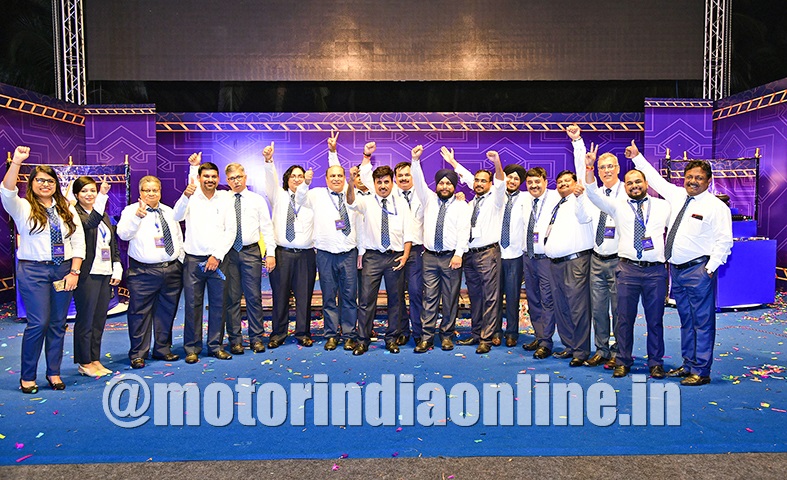Trailer mechanical suspension and truck lift axle suspension are the two new state-of-the-art offerings in the aftermarket segment from Jamna Auto Industries (JAI). Launched recently amidst much fanfare and attended by the company’s key distributors, the two products once again are trend-setters in the Indian markets.

Mr. Randeep S. Jauhar, Vice Chairman and Executive Director, said: “The objective of the launch is to increase the content per vehicle with the focus on increasing our share in the aftermarket and to make it easier for our distributors to access our products. This is in alignment with our consistent aim to be the first in the country to launch such products.”
Mr. Pradeep S. Jauhar, Managing Director and CEO, added: “We are adding more technology to our products meant for especially and including the aftermarket ones too and we are getting our aftermarket network much smoother now with these.”
Talking about the launches, Mr. Sunil Laroiya, President – R&D, shared: “We have launched trailer suspension with parabolic spring that is a first of its kind in India. As of today, multi-conventional spring is being used. Then we have also launched lift axle along with the trailer, which is also a first in our country, because in our market rigid axles are the norm. Other products that are launched include air bellows, bushes, bolts and fasteners – basically all components related to lift axles.”
Strategy – Aftermarket
JAI has literally taken a calculated risk of introducing highly engineered products into the aftermarket – which even today is unorganized mostly. In general, products made for aftermarket undergo no testing. But for JAI, it is imperative to offer an extensively tested product.

Mr. Laroiya explained it: “Absolutely zero compromise is what we follow. Even if we are selling a bolt, it is tested to make sure that once the product is launched, it is quality certified by our engineering team.”
And the so-called risk is all a well-thought out and an integral part of their aggressive marketing strategy because the quality assurance at JAI increases the brand recall value multi-fold without fail.
Mr. Bhupesh Kumar Mehta, Head – Aftermarket: “Till recently, the unorganized market was 80 per cent and the organized 20 per cent. But now the dynamics are changing. Organized is now 40 per cent and unorganized has come down to 60 per cent and it is all because of the Central Government bringing in necessary regulations. Hence we see more technology coming into the aftermarket. With gradual conversion of more of the unorganized sector into organized, we will have a fairly big chunk of business in the industry,” making this is a potentially successful move.
Evolution of the market
Hinting at how the market has evolved over the years, Mr. Laroiya added: “When we launched a lift axle in India eight years ago, the response of the OEMs used to be that this product will not work. Later in 2016, a major Indian OEM wanted us to set up a factory in 45 days time for exactly these products. And that is what we did and within no time we even started supplying parts to them for which they conferred a Gold Award on us. And today they are making close to 4,000 lift axle trucks a month. So despite it being a risk of sorts we are confident that its impact will be minimal because the way the Indian market is evolving.”
With a full-fledged state-of-the-art research, product development and manufacturing facilities in Pune and Chennai, JAI is planning to make all the components in-house for the new offerings. Shared Mr. Mehta: “This is our advantage. We will make everything in-house including fabrication. We already make springs and now we will make axles also. Our other advantage is that no other suspension manufacturer in the country has a wide footprint like we have. We can make the trailer suspension across four zones.”
And that very fact makes JAI highly competitive who capitalize on their logistical advantage. JAI boasts of top class work floors that are equipped with the latest laser cutting machines and welding machines besides a full-fledged manufacturing setup. And the company needs to off-set or counter-balance the cost factor even as they are introducing highly engineered products. Mr. Mehta agrees: “We are working constantly towards pitching our products at comparatively low-price. And one way to do that is to sell them through shorter channel partners as in we will be directly approaching the fleets to give them complete assemblies. And through our prized distributors, we shall sell spare parts.”
And JAI is sharply looking at the 1:1 replacement ratio in the aftermarket.
JAI USP
Mr. Laroiya expanded on the advantages of the parabolic spring which are lighter in weight, offer extended life in comparison to the traditional spring and a smoother ride: “Since these are mainly installed in 31, 37 and 42 tonners, and also on off-highway vehicles, they have to be light in weight and require extremely good suspensions, especially the ones that work in mines. And our products will give double the life expectancy for the suspension springs besides giving a better and smoother ride. This suspension can last up to 4,000 hours as against mechanical suspension which last for 1,000 or 1,200 hours. And when I say smoother ride I do not mean not only the comfort level but also the reduced vibrations in the vehicle. Unaddressed vibrations reduce the life of other parts, especially the electrical ones.”
Mr. Mehta further added: “The parabolic springs are 20 per cent lighter than the conventional ones. And the other advantage is the composite material that we use which contributes to the reduced weight of the components.”
JAI’s main objective is to offer products that enable minimal maintenance of the trucks for their customers. Mr. Laroiya said: “With our suspension, we are making sure that there is no breakdown in between. This kind of product will ensure that the customer can run these suspensions for lakhs of kilometers without any maintenance.”
And all this in an avant-garde R&D centre that JAI has established. Mr. Laroiya shared: “At this centre we have close to 40 design engineers working with us. We can validate from the smallest nut and bolt to a complete suspension. We have six actuators and we can test each part that goes into a suspension.”
New Material – An Edge
JAI has recently started developing composite springs for a major Indian CV OEM and the new material promises an extended life that is comparable to passenger cars. The purpose of developing new material for their products is light weighting especially in the context of upcoming BS-VI norms. Mr. Laroiya explained: “With BS-VI, there will be huge pressure on weight reduction of the vehicle. With parabolic springs, weight reduction is by 20-30 per cent but when we opt for composite material, it will further go down to 60-65 per cent.”

At JAI, light-weighting is a continuous phenomenon. Mr. Laroiya shared an example, “A major Indian OEM was using a spring that weighed 29 kgs. Then we designed a parabolic spring which was 21 kgs, and then we redesigned a high stress parabolic spring which weighed just 12 kgs. Now we have designed composite springs which brought the weight to seven kgs. What we need to make sure is that while light weighting we do not compromise on safety and engineering, and the reliability of the product.”
JAI has tied up with a company to develop special steel which can tolerate higher stress levels and is further light in weight.
Mr. Laroiya shared how their current lift axle weighs 140 kgs from the earlier 170 kgs. He said: “We have a team of about six engineers who work only on material. They are focused on getting new material, test it, keep making prototypes and validate. We keep re-inventing our material.” JAI’s test facility in Pune helps them in reducing the product development time drastically.
An interesting challenge that crops up at this juncture is that beyond a certain threshold weight reduction as a concept becomes redundant. Mr. Laroiya responds: “If a product has reached 5 kgs, we cannot go further down so we start working on our process as we may be able to increase the life of the product. And for this, we have two teams – one team works on the product design and the other on the process engineering who keep working on the innovative processes. Now we have invented a couple of new processes and we have been able to increase the life by 25-30 per cent using the same steel.”
And it is quality assurance like this that allows JAI 75 per cent market share – nothing less than a lion’s share. And now with top-of-the-line products aimed at the aftermarket JAI has made a success statement which is hard to match!

